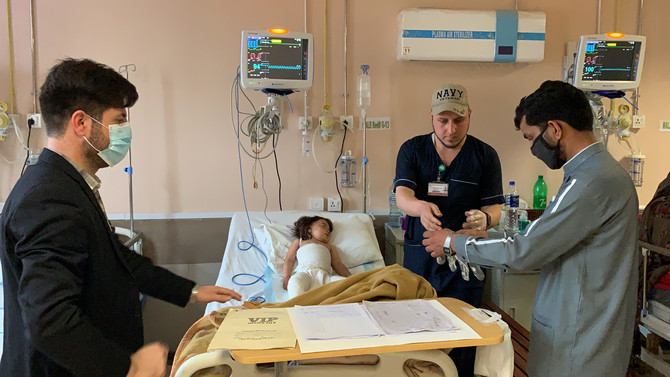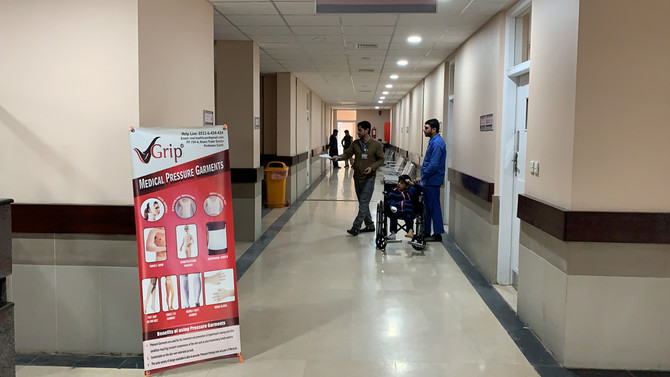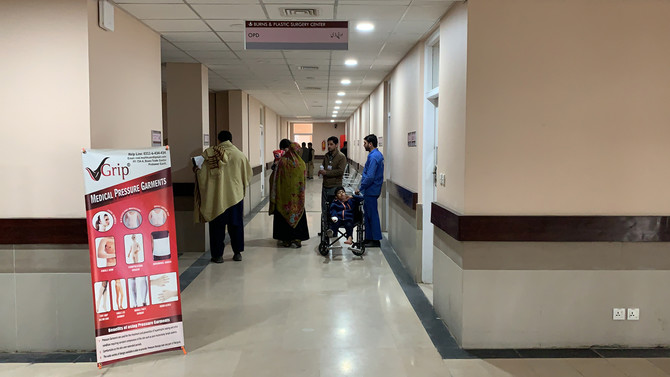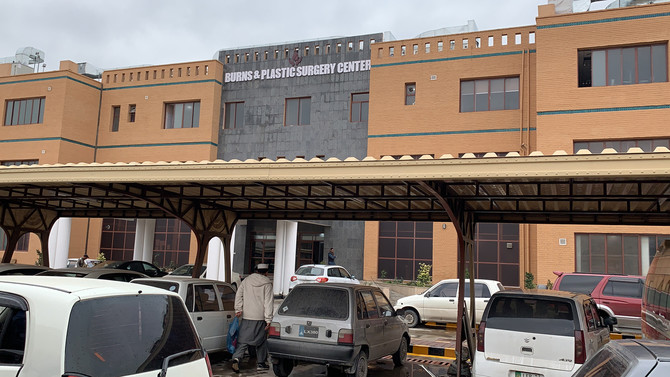PESHAWAR: After decades of waiting, Khyber Pakhtunkhwa’s first specialized Burns and Plastic Surgery Center (BPSC) will be formally inaugurated later this month, officials said on Thursday.
Professor Dr. Tahir Khan, the center’s project director, told Arab News that the medical facility, which boasts state-of-the-art equipment, became operational in November last year after facing several delays due to the non-availability of funds.
“A plastic surgery unit started operating at the Hayatabad Medical Complex in February 1997. However, it did not have a dedicated burns unit, and many people in the province were forced to go to the Burns Center in Kharian, Punjab, or similar health facilities in Islamabad. Treating burn injuries is expensive, and some of the victims ended up paying more than half a million rupees to these medical facilities,” he said.
The three-story building has 50 beds for patients, including a ward each for male, female and child patients, eight Intensive Care Units, and separate isolation and dressing chambers.
The plastic surgery section has three wards comprising 18 rooms each, including four operation theaters and five high dependency units.
Khan said that the facility cost nearly Rs3 billion to set up. “The USAID donated $15 million while the Khyber Pakhtunkhwa Workers Welfare Board and others gave nearly Rs3 billion to restart construction work on the project in 2017. We purchased most modern equipment from other countries,” he said.
“Thanks to our partners, including a German non-governmental organization, we were able to send five of our staff members for specialized training to the UK for two months. We intend to arrange more training programs like that to equip our staff with modern skills,” he said.
“The facility has treated 3,362 patients in less than three months after it became operational. A total of 528 burn surgeries and 487 plastic surgeries were also performed during this period,” Dr. Iqbal said, adding that the center provided preliminary emergency care, hand replants, free tissue transfer, trauma care and treatment for skin tumor.
The BPSC will also be supporting peripheral units in Bannu, Chitral and Dir districts of the Khyber Pakhtunkhwa province, besides providing free medicines and staff training to two similar units in Afghanistan.
“Almost 40 percent of our patients come from Afghanistan. They get the same free-of-cost treatment as our local patients,” Professor Khan said, adding that the BPSC was also training doctors at Peshawar’s Lady Reading Hospital and the Khyber Teaching Hospital.
Professor Khan added that the provincial government had been asked to establish 20-bed units for burn victims at the divisional level to provide timely medical care to patients belonging to far-flung areas.
Khyber Pakhtunkhwa’s first plastic surgery center to get a facelift
Khyber Pakhtunkhwa’s first plastic surgery center to get a facelift

- Facility provides free medicines and training to similar organizations in Afghanistan
- Province also expected to set up small-scale burn units at the divisional level
Pakistan discovers new oil, gas reserves in push to cut costly imports

- Exploration firm announces modest discovery of 225 barrels of oil, 1.01 MMSCFD of gas per day
- Multiple discoveries together could boost domestic production and reduce reliance on imports
ISLAMABAD: Pakistan has announced a modest discovery of new oil and gas reserves in its northwestern Khyber Pakhtunkhwa (KP) province, state media reported on Friday, amid the country efforts to boost exploration to cut costly imports.
Pakistan faces a widening energy gap due to rising demand and limited domestic output, forcing reliance on costly fuel imports that expose the economy to global price swings. Its petroleum, oil, and lubricants import bill fell 4.39 percent to $9.046 billion in July 2025-January 2026.
The discovery was made at Lumshiwal Formation of Baragzai X-01 exploratory well. During Cased Hole Drill Stem Test (CHDST-04) conducted in the Hangu and Lumshiwal formations, the well produced 225 barrels of oil per day (BOPD) and 1.01 million standard cubic feet per day (MMSCFD) of gas through a 32/64’’ choke at a wellhead flowing pressure of 190 psig.
“Baragzai X-01 (Slant) was spudded on December 30, 2024, as an exploratory well to assess the hydrocarbon potential of multiple formations, including Lockhart, Hangu, Lumshiwal, Samana Suk, Shinawari, Datta and Kingriali.
The well was successfully drilled to a total depth of 5,170 meters into the Kingriali Formation,” the state-run APP news agency reported, citing the Oil and Gas Development Company (OGDC).
“Based on wireline log evaluations, three earlier cased hole drill stem tests were conducted in the Kingriali, Datta, and Samana Suk plus Shinawari formations, which also resulted in oil and gas discoveries. The latest test over Lumshiwal further confirms the commercial viability and hydrocarbon prospectivity of the block.”
The discovery was made under the Nashpa Exploration License. OGDC has a 65 percent working interest in the license, in partnership with Pakistan Petroleum Limited (30 percent) and Government Holdings Private Limited (5 percent).
“This discovery will strengthen Pakistan’s energy security by enhancing indigenous hydrocarbon production,” the exploration firm said. “It will add to the reserves base of OGDC and its joint venture partners while contributing toward narrowing the country’s energy supply-demand gap.”
Pakistan has reported several oil and gas discoveries recently. Although modest individually, their combined potential could boost domestic production and reduce reliance on imported energy.
In January, a discovery regarding an exploratory well, flowing at the rate of 4,100 barrels of oil per day (BOPD) and 10.5 million standard cubic feet per day (MMSCFD) of gas, was made in Kohat. In September 2025, Pakistan Petroleum Limited announced a discovery in Attock district, while Mari Energies reported a new gas find in North Waziristan.
Pakistan’s Sindh province dominates gas production with a 62 percent share and contributes 40 percent to oil output, while Khyber Pakhtunkhwa accounts for 41 percent of crude oil production. Punjab produces 18 percent of the nation’s oil, and Balochistan contributes just one percent, according to Topline Securities.
















